
Excertos do catálogo

Implants trauma Anterior Clavicle Locking Plates System
Abrir o catálogo na página 1
CAUTION: Federal Law (USA) restricts this device to sale by or on the order of a board certified physician. WARNING: If there is no sufficient bone healing, wrong or incomplete postoperative care, plate might break. All ITS plates are preformed anatomically as a matter of principle. If adjustment of the plate to the shape of the bone is required, this is possible by carefully bending gently in one direction once. Particular care is required when bending in the region of a plate hole, as deformation of the plate may lead to a failure of the locking mechanism. The plate must not be buckled or...
Abrir o catálogo na página 2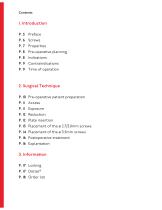
1. Introduction P. 5 Preface P. 6 Screws P. 7 Properties P. 8 Pre-operative planning P. 8 Indications P. 9 Contraindications P. 9 Time of operation 2. Surgical Technique P. 10 Pre-operative patient preparation P. 11 Access P. 11 Exposure P. 12 Reduction P. 12 Plate insertion P. 13 Placement of the 0 2.7/3.0mm screws P. 14 Placement of the 0 3.5mm screws P. 16 Postoperative treatment P. 16 Explantation 3. Information P. 17 Locking P. 17 Dotize® P. 18 Order list
Abrir o catálogo na página 3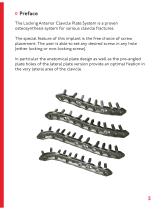
Preface The Locking Anterior Clavicle Plate System is a proven osteosynthesis system for various clavicle fractures. The special feature of this implant is the free choice of screw placement. The user is able to set any desired screw in any hole (either locking or non-locking screw). In particular the anatomical plate design as well as the pre-angled plate holes of the lateral plate version provide an optimal fixation in the very lateral area of the clavicle.
Abrir o catálogo na página 5
Cortical Screw, Locking, D=3.5mm, SH Spiral Drill D=2.7mm, L=100mm, AO Connector Screwdriver, WS 2.5, self-holding sleeve Spiral Drill D=2.7mm, L=100mm, AO Connector Screwdriver, WS 2.5, self-holding sleeve Cortical Screw, D=2.7mm Spiral Drill D=2.0mm, L=100mm, AO Connector Screwdriver, Torque, T9x70 Cancellous Stabilization Screw, D=3.0mm, RH Spiral Drill D=2.0mm, L=100mm, AO Connector Screwdriver, Torque, T9x70
Abrir o catálogo na página 6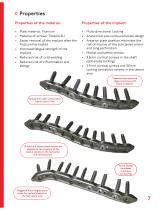
Properties Properties of the material: • Plate material: Titanium • Material of screws: TiAl6V4 ELI • Easier removal of the implant after the fracture has healed • Improved fatigue strength of the implant • Reduced risk of cold welding • Reduced risk of inflammation and allergy • Multi-directional Locking • Anatomical pre-contoured plate design • Anterior plate position minimizes the risk of injuries of the subclavian artery and lung perforation • Medial and lateral version • 3.5mm cortical screws in the shaft (optionally locking) • 2.7mm cortical screws and 3.0mm locking cancellous screws...
Abrir o catálogo na página 7
Pre-operative planning Meta- and diaphyseal clavicle fractures Far lateral clavicle fractures Open and closed fractures Non-unions Mal-unions Corrective os
Abrir o catálogo na página 8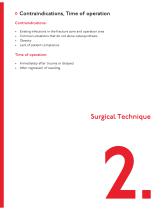
Contraindications: ♦ Existing infections in the fracture zone and operation area ♦ Common situations that do not allow osteosynthesis ♦ Obesity ♦ Lack of patient compliance Time of operation: ♦ Immediately after trauma or delayed ♦ After regression of swelling
Abrir o catálogo na página 9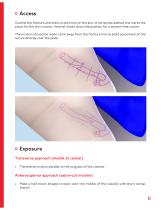
Access Outline the fracture and draw incision line on the skin. A horizontal dashed line marks the place for the skin incision. Vertical marks show the position for a tension free suture. The incision should be made 1-2cm away from the fracture line to avoid placement of the suture directly over the plate. Exposure Transverse approach (medial to lateral) • Transverse incision parallel to the long axis of the clavicle. Anterosuperior approach (sabre-cut incision) • Make a half-moon shaped incision over the middle of the clavicle with short dorsal branch
Abrir o catálogo na página 11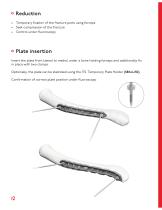
Reduction • Temporary fixation of the fracture parts using forceps • Seek compression of the fracture • Control under fluoroscopy Plate insertion Insert the plate from lateral to medial under a bone holding forceps and additionally fix in place with two clamps. Optionally, the plate can be stabilized using the ITS. Temporary Plate Holder (58164-150). Confirmation of correct plate position under fluoroscopy.
Abrir o catálogo na página 12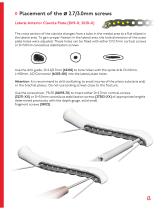
Placement of the Ø 2.7/3.0mm screws Lateral Anterior Clavicle Plate (21119-X; 21120-X) The cross section of the clavicle changes from a tube in the medial area to a flat ellipse in the lateral area. To gain proper fixation in the lateral area, the hole dimension of the outer plate holes were adjusted. These holes can be filled with either D=2.7mm cortical screws or D=3.0mm cancellous stabilization screws. Use the drill guide, D=2.0/2.7mm (62202) to bore holes with the spiral drill D=2.0mm, L=100mm, AO Connector (61203-100) into the lateral plate holes. Attention: It is recommend to drill...
Abrir o catálogo na página 13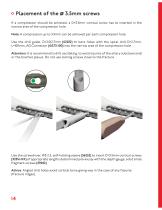
Placement of the Ø 3.5mm screws If a compression should be achieved, a D=3.5mm cortical screw has to inserted in the narrow area of the compression hole. Note: A compression up to 3.5mm can be achieved per each compression hole. Use the drill guide, D=2.0/2.7mm (62202) to bore holes with the spiral drill D=2.7mm, L=100mm, AO Connector (61273-100) into the narrow area of the compression hole. Attention: It is recommend to drill oscillating, to avoid injuries of the artery subclavia and/ or the brachial plexus. Do not use locking screws close to the fracture. Use the screwdriver, WS 2.5,...
Abrir o catálogo na página 14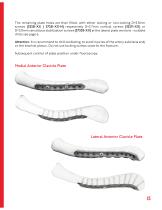
The remaining plate holes are then filled, with either locking or non-locking D=3.5mm screws (32351-XX / 37351-XX-N) respectively D=2.7mm cortical screws (32271-XX) or D=3.0mm cancellous stabilization screws (37303-XX) at the lateral plate versions - suitable drills see page 6. Attention: It is recommend to drill oscillating, to avoid injuries of the artery subclavia and/ or the brachial plexus. Do not use locking screws close to the fracture. Subsequent control of plate position under fluoroscopy. Medial Anterior Clavicle Plate Lateral Anterior Clavicle Plate
Abrir o catálogo na página 15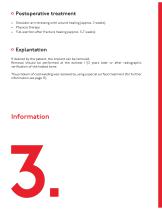
Postoperative treatment • Shoulder-arm dressing until wound healing (approx. 2 weeks) • Physical therapy • Full exertion after fracture healing (approx. 5-7 weeks) Explantation If desired by the patient, the implant can be removed. Removal should be performed at the earliest 1 1/2 years later or after radiographic verification of the healed bone. The problem of cold welding was resolved by using a special surface treatment (for further information see page 17).
Abrir o catálogo na página 16Todos os catálogos e folhetos técnicos I.T.S.
-
ufs
1 Páginas
-
DHL
2 Páginas
-
ITS
2 Páginas
-
DHL - Distal Humeral Locking Plates
20 Páginas
-
PHL
24 Páginas
-
CFN
32 Páginas
-
OLS
24 Páginas
-
PHLs
20 Páginas
-
CTN - Cannulated Tibia Nail
28 Páginas
-
UOL - Ulna Osteotomy Locking Plate
32 Páginas
-
SR Sacral Rods
20 Páginas
-
HCS
24 Páginas
-
TOS Twist-Off Screw
20 Páginas
-
TLS
20 Páginas
-
PRS-RX
32 Páginas
-
HLS
20 Páginas
-
PLS - Pilon Locking Plates System
24 Páginas
-
ES
20 Páginas
-
SR
20 Páginas
-
FL
24 Páginas
-
PL - Pilon Locking Plate small
12 Páginas
-
PRS - Pelvic Reconstruction System
28 Páginas
-
PRL - PROlock Radius Locking Plate
20 Páginas
-
OHL - Olecranon Hook Locking Plate
24 Páginas
-
OL - Olecranon Locking Plate
24 Páginas
-
PHL - Proximal Humeral Locking Plate
28 Páginas
-
CAS
40 Páginas
-
FCN
20 Páginas
-
HOL
24 Páginas
-
FLS
24 Páginas
-
PFL
20 Páginas
-
DTL
24 Páginas
-
HTO
24 Páginas
-
PTL
32 Páginas
-
DFL
32 Páginas
-
SCL
32 Páginas
-
SLS
24 Páginas
-
CAL
20 Páginas
-
DUL
24 Páginas
-
CLS
28 Páginas









































































